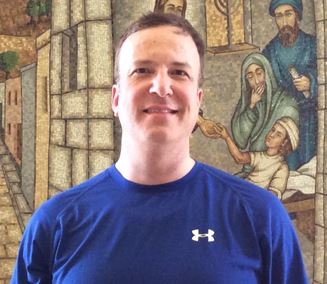 From time to time, our teens, just as adults do, struggle with how to integrate our Catholic Faith with the rich and diverse world we live in. Last Sunday, after the 4pm Mass, Melanie Tomal, the Associate Director of our junior high and high school programs here at Holy Family, acted as facilitator of questions composed by our FLAME (Friendship, Leadership, Acceptance, Ministry, and Education) teens. Dr. Peg Hanrahan, the Director of Family and Teen Faith, and I (Fr. Rich), held an hour-long panel discussion in the church. The teens raised great questions about faith, moral and ethical issues facing the Church and world today. Here is a sample of the questions they came up with:
From time to time, our teens, just as adults do, struggle with how to integrate our Catholic Faith with the rich and diverse world we live in. Last Sunday, after the 4pm Mass, Melanie Tomal, the Associate Director of our junior high and high school programs here at Holy Family, acted as facilitator of questions composed by our FLAME (Friendship, Leadership, Acceptance, Ministry, and Education) teens. Dr. Peg Hanrahan, the Director of Family and Teen Faith, and I (Fr. Rich), held an hour-long panel discussion in the church. The teens raised great questions about faith, moral and ethical issues facing the Church and world today. Here is a sample of the questions they came up with:
- What is the difference between a Catholic and a Christian?
- Why did Jesus reappear to the disciples multiple times after death but he doesn’t appear now?
- Why did God even need to send someone to His death? Why couldn’t He just take away sins himself?
- Why do we believe that the bread and wine turn into the body and blood of Christ rather than just become a symbol of it?
- What does God look like?
- Why does God let bad things happen (death, diseases, homelessness)?
- Why does it feel like religion counters things I’ve learned elsewhere? Like the world being created in 7 days, etc…
- What does the Bible really say about being gay?
What I hoped to communicate to our teens in the panel discussion was both a respect and gratitude to my teachers and professors in high school, college, and seminary, who supported and encouraged my growth in faith and my development as a critical thinker.
Prior to entering the seminary, I had a science teacher at Ridgewood High School in Norridge by the name of Mr. Fred Hein who made a distinctive impression on me and my faith. At one of the initial lectures in the auditorium, he announced to the students that he was a man of both science and faith. He encouraged me and my classmates to have an open mind and see science and religion as compatible with one another. I remember some of the students around me expressing their own skepticism of the compatibility of religion and science and discounting his perspective. I, however, felt a bit more optimistic that the objective world we were discussing in science could also support a search for a deep and abiding faith in God.
Questioning and debate has been part of the Catholic tradition from the beginning of its history and is an integral part of its dynamic of “faith seeking understanding.” The truths discovered by other cultures and by science, art, and other disciplines of academics are prized by our Catholic tradition. Some of my favorite professors at the seminary – Fr. Jack Shea, Fr. Bob Barron, and Fr. Larry Hennessey – taught their theology classes with a focus of integrating faith in God with the world we live in, while deepening our own sense of self. The challenge of how to balance and integrate our engagement within the world and the living Christ lies at the heart of our Catholic calling. This Catholic approach aims for unity and universality and the cultivation of love for nature, for others, and especially for God. It is such love of other-directedness that allows us to respect our own experience and the unique experiences of one another. An intellectual tradition in the mystery of Christ enhances our understanding of ourselves and the world, rather than blinds us from deeper truths. The history of the Church and of Western civilization testified to the fruitful interchange between Catholic culture and the sciences. In past situations, where conflict arose between science and religion, a shared concern for the common good prevailed and continues to lead us to a more constructive resolution of these conflicts.
Some of the conflicts that exist between the Church and the diverse world we live in today can only be resolved through the passing of time, the contributions of new generations, and a shift in our willingness to listen more attentively to the complexity that influences the discernment of higher learning. The Catholic intellectual tradition is a way of thinking about God, humans, and the world in which love rather than methodical questioning is the primary motive in drawing the thinker to discover the truth that makes all things work together for good. Just as the individual thinker has a mind, body and spirit in a fruitful interplay, so also our Catholic community, with its diverse members, is called to complement and challenge one another. I hope our teens continue to follow the rich Catholic intellectual tradition here at Holy Family and embrace a holistic model where unity does not always have to equal uniformity of thought. I am proud of our teens who shared their questions, thoughts, and beliefs in the context of a healthy and respectful dialogue.
(Fr. Rich Jakubik, Holy Family’s Associate Pastor, will write this column while Fr. Terry is away.)